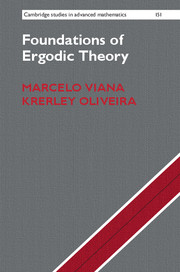Book contents
- Frontmatter
- Contents
- Preface
- 1 Recurrence
- 2 Existence of invariant measures
- 3 Ergodic theorems
- 4 Ergodicity
- 5 Ergodic decomposition
- 6 Unique ergodicity
- 7 Correlations
- 8 Equivalent systems
- 9 Entropy
- 10 Variational principle
- 11 Expanding maps
- 12 Thermodynamic formalism
- Appendix A Topics in measure theory, topology and analysis
- Hints or solutions for selected exercises
- References
- Index of notation
- Index
2 - Existence of invariant measures
Published online by Cambridge University Press: 05 February 2016
- Frontmatter
- Contents
- Preface
- 1 Recurrence
- 2 Existence of invariant measures
- 3 Ergodic theorems
- 4 Ergodicity
- 5 Ergodic decomposition
- 6 Unique ergodicity
- 7 Correlations
- 8 Equivalent systems
- 9 Entropy
- 10 Variational principle
- 11 Expanding maps
- 12 Thermodynamic formalism
- Appendix A Topics in measure theory, topology and analysis
- Hints or solutions for selected exercises
- References
- Index of notation
- Index
Summary
In this chapter we prove the following result, which guarantees the existence of invariant measures for a broad class of transformations:
Theorem 2.1 (Existence of invariant measures). Let f : M → M be a continuous transformation on a compact metric space. Then there exists some probability measure on M invariant under f.
The main point in the proof is to introduce a certain topology in the set M1(M) of probability measures on M, that we call weak* topology. The idea is that two measures are close, with respect to this topology, if the integrals they assign to (many) bounded continuous functions are close. The precise definition and some of the properties of the weak* topology are presented in Section 2.1. The crucial property, that makes this topology so useful for proving the existence theorem, is that it turns M1(M) into a compact space (Theorem 2.1.5).
The proof of Theorem 2.1 is given in Section 2.2. We will also see, through examples, that the hypotheses of continuity and compactness cannot be omitted.
In Section 2.3 we insert the construction of the weak* topology into a broader framework from functional analysis and we also take the opportunity to introduce the notion of the Koopman operator of a transformation, which will be very useful in the sequel. In particular, as we are going to see, it allows us to give an alternative proof of Theorem 2.1, based on tools from functional analysis.
In Section 2.4 we describe certain explicit constructions of invariant measures for two important classes of systems: skew-products and natural extensions (or inverse limits) of non-invertible transformations.
Finally, in Section 2.5 we discuss some important applications of the idea of multiple recurrence (Section 1.5) in the context of combinatorial arithmetics. Theorem 2.1.5 has an important role in the arguments, which is the reason why this discussion was postponed to the present chapter.
Weak*topology
In this section M will always be a metric space. Our goal is to define the so-called weak* topology in the set M1(M) of Borel probability measures on M and to discuss its main properties.
- Type
- Chapter
- Information
- Foundations of Ergodic Theory , pp. 35 - 63Publisher: Cambridge University PressPrint publication year: 2016

